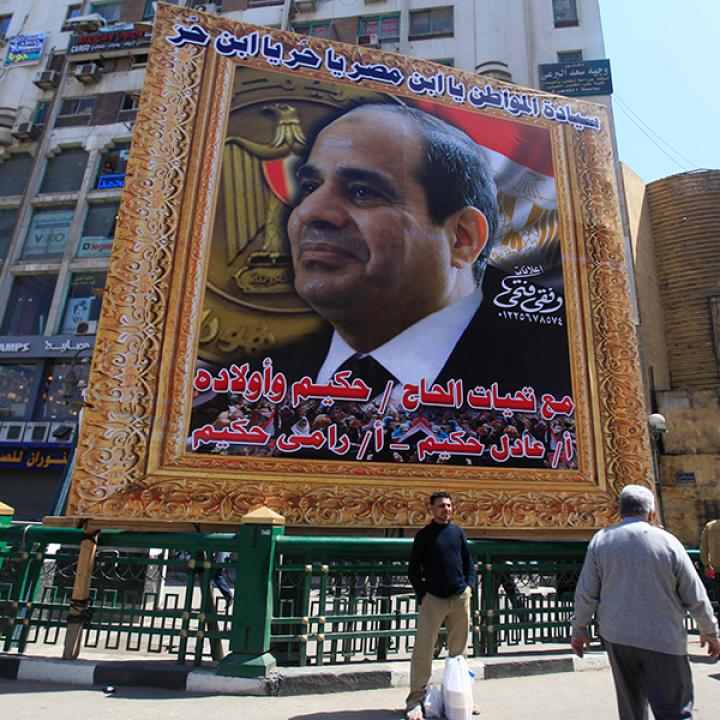
- Policy Analysis
- Articles & Op-Eds
President Trump, Condemn This Sham Egyptian Election

In banishing any credible opponents, Sisi has shown his true intentions—and imperiled the future stability of his country.
Four years after a bloody coup ended Egypt's difficult transition to democracy, the most populous country in the Arab world is heading toward its fourth presidential vote. The Trump administration should call this exercise what it is: a sham and disgraceful election, the result of a dirty attempt to intimidate and discourage each and every would-be opponent from challenging incumbent President Abdel-Fattah el-Sisi.
The campaign began last November when Khaled Ali, a lawyer, held a press conference announcing his candidacy. He was followed by Ahmed Shafik, former senior commander in the air force. Lieutenant General Sami Anan followed by announcing his candidacy late last month. But by the end of the registration process, all those serious candidates had been purged. Only one pseudo candidate came out of the blue: Moussa Mustafa Moussa, an architect and head of the al-Ghad Party. Unsurprisingly, his Facebook profile had statements and pictures endorsing Sisi until he registered his name 15 minutes before the deadline.
Translation: he is a fake opponent, not a real one. So how did the other candidates get forced out of the race?
Sisi first silenced Shafik. Not long after he announced his intention to run for election, he was held against his will at a five-star hotel for two weeks until he reversed his decision to run—and issued a statement praising the Egyptian dictator's magnificent work for the country. Next up: Anan. He was thrown in a military prison under suspicious and trumped-up charges once he announced his intention to run for election. After that, Sisi's brutal grip extended to the nephew of former Egyptian President Anwar Sadat. He was pressured not to run and could not even book a ballroom at hotels to hold a press conference to announce his intention to run.
Finally, longtime leftist activist and lawyer Ali had to withdraw after enduring continuous harassment from the security forces and their civilian lackeys. He faced an idiotic lawsuit that could have put him in prison for an indecent hand gesture, then eventually gave up and withdrew after witnessing the writing on the wall, noting what the regime had done to the ex-military generals.
Sisi's lack of confidence in fair and free elections stems from his worries that the Egyptian people seek a new chapter with a different candidate after enduring harsh economic decisions and a scarcity of political freedom. A real competitive election against ex-military generals or a credible civilian candidate would expose the frailty of Sisi's regime and his lack of sound political skills. His biggest worry is obvious: the coalescence of the political opposition around a viable platform and candidate. Therefore, he arrested his strong opponents, seeking a landslide victory that would enable him to amend the Constitution to run for a third term and stay in power for life.
The events of the last two weeks prove that the Egyptian dictator never believed in the peaceful transition of power and has no intention to give up power once his second term ends in 2022. These developments are ominous for the country's future, proving that Sisi is moving toward a point of no return. Indeed, this dictatorial approach will lead Egypt to a disastrous situation that will make the chaos that followed the 2011 uprising look good by comparison.
Sisi has repeatedly emphasized his willingness to crush any opposition to his rule and the military's grip on power regardless of its goals or peacefulness. A Syria-like scenario could await Egypt if events spiral out of control due to the lack of political freedoms and the severe repression Egyptians are enduring under Sisi.
President Trump, for his part, has developed a personal rapport with his Egyptian counterpart; he has praised him as doing "a tremendous job under trying circumstances." Perhaps he could use this rapport to convey to Sisi the deepest U.S. worries for the future of stability in Egypt. The failure of a country of 100 million is a disaster the region can avoid—but perhaps only if the United States starts registering forceful objections to Sisi's dictatorial policies. In the meantime, nobody in the White House or on the Hill should take this election seriously.
Haisam Hassanein is the Glazer Fellow at The Washington Institute.
New York Daily News



